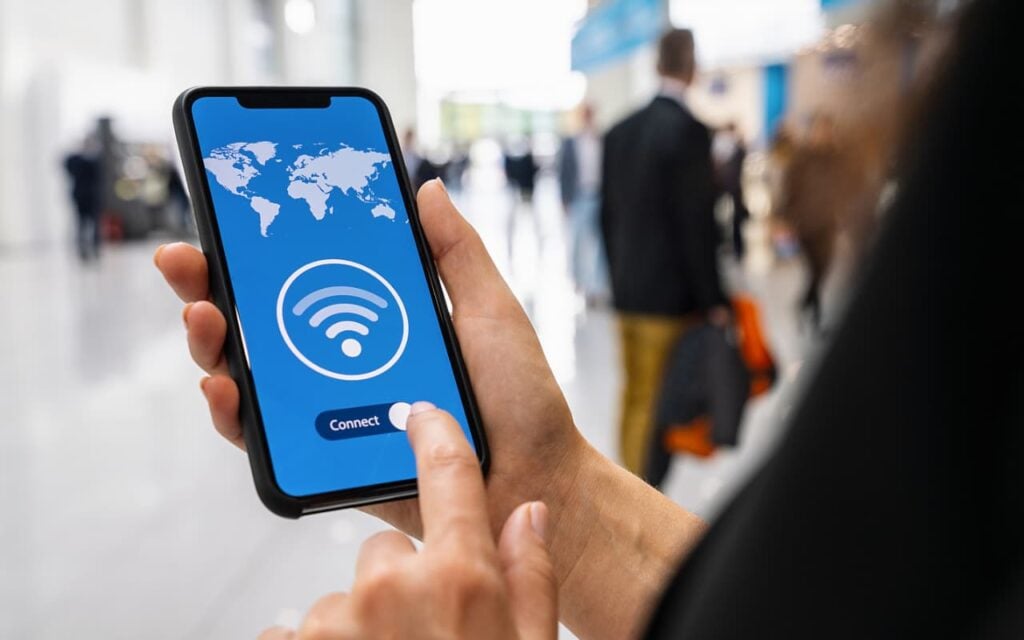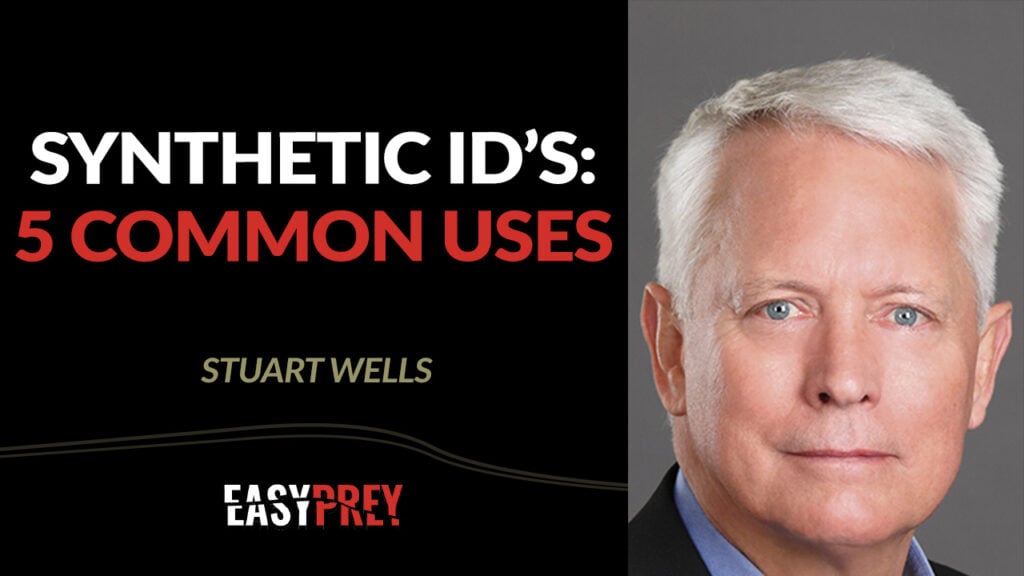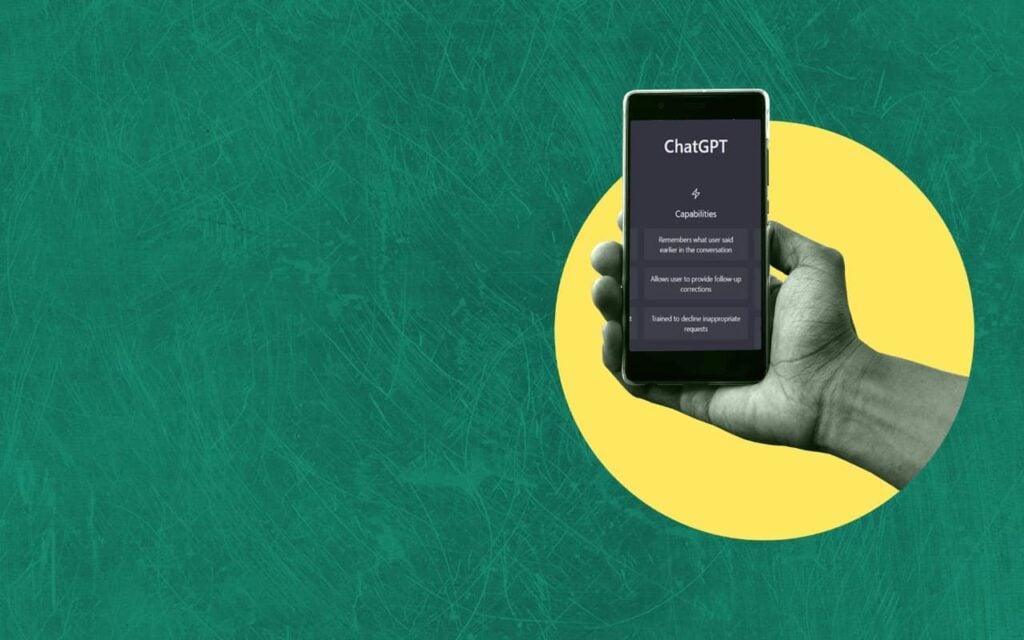Parental Control Software: The Best Ones for Protecting Kids Online
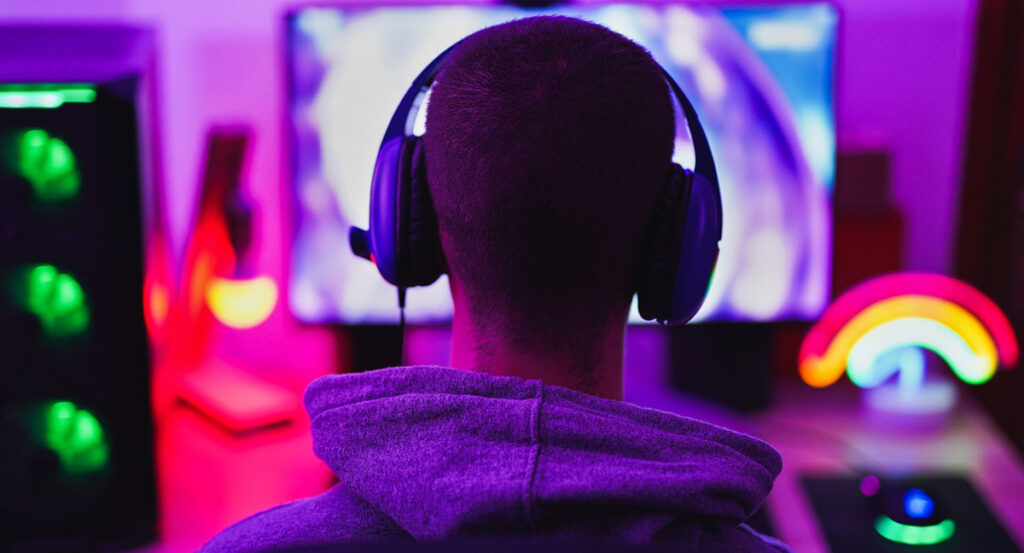
There is a growing need for parental control software programs, a tool parents don’t know exists and don’t know they need.
Here are 4 top parental control software choices recommended by WhatIsMyIPAddress.com.
- Bark – Explore Bark with a 7-day free trial.
- Qustodio – Basic plan is $4.60 per month (paid for 12 months in advance).
- Net Nanny – Family Protection Plan: 5 devices covered for a $55 annual cost, a 30% savings.
- Aura – 60% off for a limited time. Also, a 14-day free trial.
Your kids’ world is a lot different from what yours was.
In 2023, there a two categories or parents or guardians. (We’ll simply say parents through this article to make it simple.)
The unaware and clueless (but caring): Those parents who allow their children (from ages 5-18) to have access to phones and computers and any program or app they wanting to explore—and are either oblivious to the dangers kids face or don’t know they can do something about.
The newly aware and concerned: Those parents with children who’ve had bad experiences online or that realize how truly harmful and quite dangerous the internet can be for kids.
It’s time for parents to be aware of the biggest predator out there, the one that’s active and pervasive.
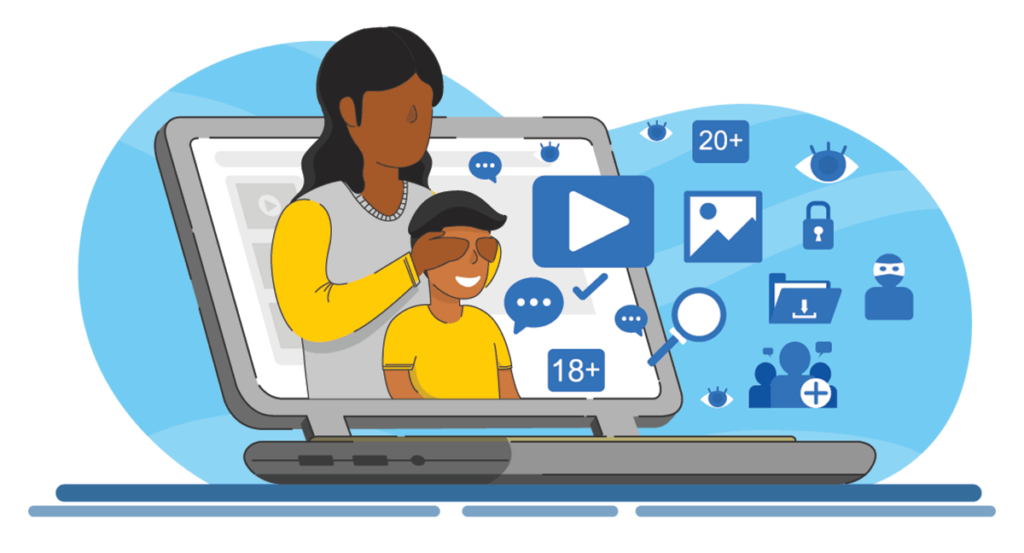
Every day and every minute. It is the biggest influence on your childrens’ thoughts, dominates their time, steals their focus and lures them into a world that’s more illusion than reality.
Who’s the predator?
The internet.
Parental controls: That Was Then. This is Now.
Was keeping kids out of harm’s way easier before the Internet? It had to be. Before the internet, parents and children could navigate their universes fairly easily. Sure, teens and kids could find trouble on their own, but their spheres of influence were pretty normal.
- Friends at school.
- Neighborhood friends.
- Sports buddies and teammates.
- Groups and club classmates.
Parents could be involved with their kids’ lives fairly easily. Protecting them seemed somewhat possible.
That all changed shortly after the turn of the century when the internet truly arrived. And that wasn’t all that changed. Cellphone technology exploded. So did social media sites and online apps of all kinds.
All this was supposed to make our lives better, more streamlined, and more connected to people, information and resources.
It did that, and more. It also has given rise to online content that has no rating, no restrictions, no barriers to entry and no concern at all over potential negative impacts on society, truth, misinformation and children.
The top parental control software programs today.
Let’s take a little deeper look at these popular and higher-rated parental control programs.

“Parental controls that build trust.”
Bark believes that kids deserve online protection and parents deserve peace of mind.
- Nearly 7 million children are protected by Bark.
- Basic and advanced parental controls available
- 30+ apps and social media monitoring
- Keyword alerts available
- Bark even has a special phone for kids.
- Free trial offer
- Promotional discount for new customers

“Create a safe space for your kids to explore and play online.
- Filter content and apps
- Monitory real-time internet activity
- Set screen time limits.
- Track phone calls and texts content
- Free 30-day trial

“The best parental control to keep your kids and family safe online.”
- Block websites and apps you don’t approve.
- Manage and control screen time for kids.
- Filter content for your family in real time
- Real-time alerts on porn, weapons, drug-related, content, etc.
- Family Protection Plan
- 30% off for new accounts

“Tackles the issue of online safety for families head-on” – Endorsed by Robert Downey Jr.
- Filter, block and monitor websites
- Set screen time limits.
- Customize what your kids can access online.
- Includes antivirus and data breach alerts.
- 30-day free trial offer
- Promotional discount for new customers
Why parental controls are needed, and why it’s an issue.
The dangers that exist in the online world today are real and not an exaggeration. You probably know that yourself by now. If you’re a parent or grandparent, you might be well aware that the children are exposed to ideas and content that you probably do not approve.

Here are examples of the types of dangers kids could stumble into alone on the internet.
- Potential gaming addiction
- Gaming addiction
- Money scams
- Sexual predators
- Identity theft
- Cyberbullying
- Mental and sexual abuse and harassment
- Phishing scams
- Malware downloads
- Loss of innocence
- School problems
- Anxiety issues
- Self-harm
- Behavior and family problems
- Sexual exposure, sexual addiction
- Information theft
- Sexting and blackmail
Taking the fight to the internet.
You can’t do anything to change the internet itself. However, you definitely can do something about what your kids can do and see on the internet.
That’s what the concept of parents getting involved with their children’s internet usage is all about. It is simply the idea of taking a stand and choosing to have parental control over what your kids can see online.
And that is where parental control software comes in. Parental control apps and programs were created for parents who care enough deeply about their children’s well-being and future. They don’t want the negative influences of the internet harming their children.
Here’s the most important point. The negative affect of the internet is something society cannot afford to ignore. Parents need to know what’s going on…and what they can do.
There’s a crisis when it comes to protecting kids online.
You’re going to want to investigate a handful of programs after you read this article, starting with a few of the best-reviewed that we listed above. Taking care of your kids could be as simple as choosing one of the apps and using the features that you think are most needed for your family, and your peace of mind.
Here’s a brief description of four parental control apps mentioned earlier. This could be the first, yet decisive step you can take today toward protecting your kids online.
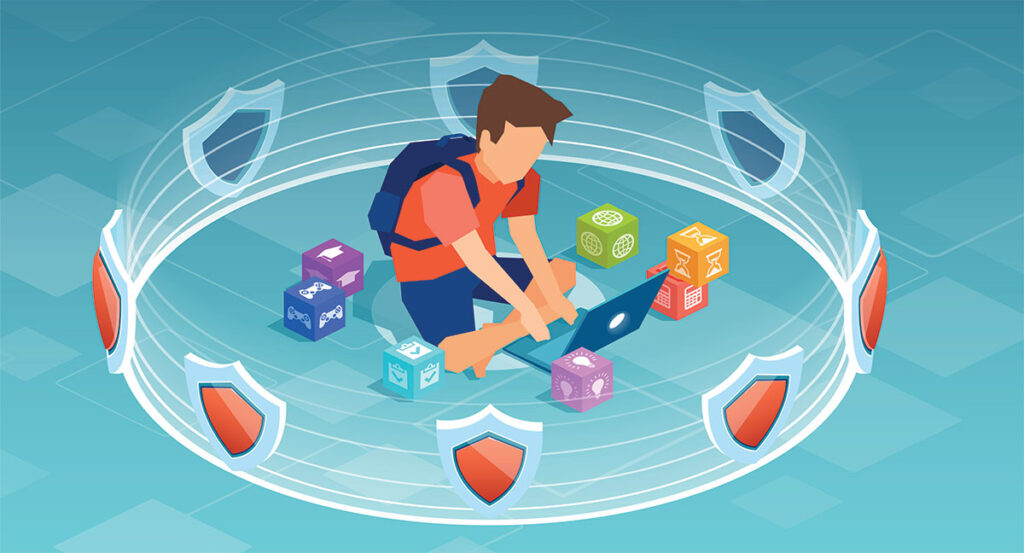
How do parental control software programs work?
Parental control software programs put you in control. It lets parents put up a digital, protective wall between their kids and the internet, between their kids and social media usage, and between their kids and today’s popular apps.
These programs are purchased by parents, installed and controlled by parents (on their primary device), and then installed on their children’s devices. Then, from behind the scenes (almost as if behind a magic curtain) parents can control their kids digital lives.
You can load this programs and protect a wide range of devices…whatever your kids and using.
- Personal computers (PCs using Windows). PCs are popular with gamers: (examples: Dell, HP, Lenovo and Microsoft).
- Macs (Apple computers and laptops). Preferred by teens and college students.
- Chromebooks: used at many elementary schools during the pandemic.
- iPhones and iPads (by Apple). The most popular phone choice for teens.
- Android cellphones. Samsung, Motorola and Google for example.
Let’s take a little deeper look at these popular and higher-rated parental control programs.
Where is the media in all this crisis? Nowhere to be heard from.
The media and news outlets do not regularly report on the dangers of the internet when it comes to children and teens. There are times they will report on stories, but only if a child has been abducted by a predator, or if a sex-trafficking ring has been broken up.
Even then, it’s simply a news story that doesn’t get a lot attention—certainly not the type of attention it needs.
What they don’t report on is so disturbing, because the problem is real and it affects the most vulnerable segment of the population, our kids.
Consider this: If you personally are not aware of the types of stories and statistics involving internet dangers affecting kids, that should tell you something. The media and developers of websites and apps seem to be ignoring what should be a hot-button topic.
A school shooting will make the news (and rightfully so) because it’s sensational and makes headlines.
The internet content vs. kids crisis hasn’t reached that level…yet.
Maybe you do know what’s out there.
For sure, there are plenty of parents that no exactly what type of content is out there for all to see. Perhaps they know (do you know?) because they are adults, it’s okay for them to act like adults, and they know the risks and consequences. (Yes, they still exist for grown-ups).
Now take a step back?
Do you really want your kids to see that?
You would think that most parents want to keep their children safe from the dangers of the world….and most parents likely would agree with you. The parental instinct to protect their kids is strong.
But most parents, even caring and generally protective parents, have a blind spot that could prevent them from recognizing the content threatening their kids’ well-being today. Maybe even their family’s well-being.
Let this be your wake-up call before something disastrous truly does happen.
Here’s what you and every parent need to realize:
- If you have teenagers and they’ve been on the internet unsupervised the past few years, it may not be too late to protect them and save them—but you must take action now.
- If you have talked to your kids about the dangers of the internet, but done nothing more than that, you have done little to protect them.
- If you’re concerned about invading your kids’ privacy, you’re letting the internet control their lives and opening them up to unsavory content and people.
- If you are just starting a family, establish parental controls now and don’t lose sight of your goals and vision for your children’s future.
Let this message be a wakeup call.
Why parental controls are needed: What every parent needs to realize and respond to.
It would be nice to think that the internet is like an online playground with games, movies, and plenty of friends to meet and interact with.
Maybe that’s what it was supposed to be like. But it’s not like that at all.
Here are the cold, plain facts about your kids, the internet and your world:
- No one cares for your children’s lives and values more than you do.
- The internet is a digital world with all types of characters in it. Good and evil.
- There is not a safe “kids section” or a “safe space” on the internet.
- There are no restrictions—none at all—on the internet when it comes to content.
- The developers of questionable apps and websites do nothing to keep your kids out. In fact, they likely do whatever they can to let your kids in. For them, it’s good for business.
- The internet your children are using right now is unsupervised. If you’re not there to protect them, they are, in fact, unprotected.
These aren’t the good old days, as if they ever existed.
In general, the dynamic between parents and their kids goes something like this:
When kids are 5 to 8 years of age and are able to spend any time away from their parents’ view or voice, parents usually give kids a set of rules, in the form of “do’s and don’ts” behaviors:
- Don’t go anywhere you shouldn’t.
- Ask us permission before you go anywhere.
- Don’t talk to strangers.
- If you feel weird about something, stop and don’t do it.
- If someone is making you feel uncomfortable, tell a grown up or your parents.
- Come home after a certain time; or “we’ll pick you up” at a specific time.
How would you add to this list? Keep this in mind as you think about it:
- Just think about how you were raised and what your family’s rules were.
- Also, think about those kids you knew who didn’t have the same kind of rules as you.
- Finally, ask yourself this—how well did you follow the rules your parents gave you.
Safety and danger seemed clearer back then. Now, add the internet factor to this and everything changes.

Your kids don’t need permission to go online and visit any website.
That’s a pretty shocking revelation, isn’t it?
Does anyone need a refresher course on how the “Internet Age” has changed the world? Probably not. But what’s been lost in all the developments of the past 30 years is how the internet affects children.
Content and topics that you do not want your children (as young as 5 year’s old) to see or know about is online right now. And easily available to them.
That’s the reality in this day and age.
Plus, your children can see it discover bad stuff accidentally or purposefully if they…
- Know how to go online and get to it.
- Happen to stumble onto it.
- See it on your computer or device; or are shown it by a friend.
- Click on a link accidentally on a text or message they receive.
- Have NO restrictions or blocks on their phones or computers.
You can’t un-ring a bell.
- Children as young as 5 years old, maybe even younger, are being exposed to the internet. Worse yet, they’re being exploited on the internet.
- Teens who are on the internet several hours a day are more likely to feel negative feelings. They could experience hopelessness and suicidal thoughts.
- It’s not simply being on the internet that is problematic. It’s the nature of negative content they’re consuming or being consumed by.
- Pediatricians say children under two years of age shouldn’t even be exposed to tablets, computers or cellphone screens.
Sadly, as you probably see every day, digital devices have become a convenient babysitter for busy or distracted parents.
Sometimes those parents, who are busy working and are on their own phones, use digital devices to keep their kids occupied.
A cellphone is a telephone. However, the internet is not a book.
A daily consumption of online content on social media or popular apps is not passive behavior.
Social media apps and virtually every website are collecting user data, as well as tracking online behavior and content choices. The apps and websites also make content suggestions to users using algorithms. The website developers and operators keep feeding users more and more content.
It’s been proven that online behavior can become addictive, and shape someone’s mood, beliefs and behavior.
Parents take note. It’s not simply that kids may be viewing harmful content online. They are also certainly spending too much of their time online, interacting with friends, watching videos, texting and counting their likes on social media.
They are living online lives and losing touch with what’s real.
What parental controls let a parent do.
As you might have noticed, the most popular programs offer parents a baseline of parental control. Here are perhaps the most sensible or logical features:
- Prevent exposure to pornography and harmful content.
- Catch cyberbullying in real-time and stop it.
- Blocking apps and websites
- Location tracking in real-time.
That’s just a small taste of the features that are available. This comprehensive list of parent control potential features is simply a list.
Parental control features you might look into:
- Location tracking and arrival check-in.
- Manage and even limit screen time.
- Controls the apps they use and monitor them by time used.
- Block inappropriate apps and limit access.
- Automatically block forbidden websites.
- Monitors gaming activity.
- Manage screen time and create custom schedules.
- Monitor and control internet activity.
- Receive parental alerts to online dangers.
- Receiving real-time cyberbullying.
- Pause or disable your kids online access remotely.
- Set up parental approval for kids to download apps or add contacts.
- Protect all your family’s devices.
- Receive text and voice threat alerts on gaming sites.
- Receive alerts when your kids try to access blocked content.
- Get alerts when a dangerous website gets visited.
- Filter web content and apps.
- Get notifications if kids go onto the “dark web.”
- Track phone calls and text (SMS) messages.
- Get reports and alerts on what websites were visited.
- Receive emergency messages if danger is detected.
- Block porn and other unsuitable content.
- Get content/message alerts on kids’ social media accounts.
- Required approval before kids can download any app.
- Detailed logging activity that actually tracks keystrokes.
- Know which websites they visit and how long they stayed.
- Get a report of any “screen grabs” they make.
- Create and submit a “blacklist” that automatically prevents your kids from seeing inappropriate content online.
- Custom design internet or app age restrictions, and usage rules (no gaming or internet on school nights).
- Monitor and manage their social media usage.
- Receive real-time alerts if they visit websites that should be off-limits.
- Get reports and updates on their activity and history.
No one parental control software program offers all or even most of the features below. However, if you are drawn to some features in particular, you can search for the parental control programs that offer more of what you seek.
Parental controls, or governmental controls?
If you don’t take the lead to protect your children, who will? The government?
That just may be where things are headed, and that might be a good thing. In early 2023, Missouri Senator Josh Hawley has introduced a pair of bills aimed at protecting kids online. The first calls for an age requirement of 16 in order for someone to be able to use social media.
Did you hear of that motion? Probably not. But it’s at least a public acknowledgment that there is a crisis when it comes to kids and the internet.
“Children suffer every day from the effects of social media,” Hawley said in a statement. “At best, Big Tech companies are neglecting our children’s health and monetizing their personal information. At worst, they are complicit in their exploitation and manipulation.”

Hawley knows big tech has a major responsibility when it comes to keeping kids safe. He also knows they’re failing in their responsibility, putting profits, popularity and usage ahead of doing what’s right.
He also knows that if big tech won’t “self-police,” then maybe the U.S. government has to step in to do something to take care of kids in the U.S. But his proposal begs a bigger question in all of this.
Where are the parents in this key issue? Have they fully grasped exactly what’s at risk?
Are they aware that there is a genuine, ongoing battle for their kids’ souls online, on social media, gaming sites and other apps?
Attention parents: you simple cannot afford to hope for the best or, even worse perhaps, be naive.
Parents vs. the Internet. Guess who’s been winning?
Predators, porn-site developers, scammers and blackmailers, say “bring us your kids.”
Maybe parents should understand that the “dark side” element of the online community wants to engage your kids in all kinds of ways.
- Pornographers want to expose them to adult content.
- Predators on social media want to have private conversations with them.
- Scammers want to lure your kids into risky behaviors then blackmail them.
- Older kids want to introduce youngsters to new websites and apps.
- People with different values from yours want to encourage your kids to live their own lives, express own values.
- Social media apps don’t want to censor themselves and want your kids to grow up fast.
- People who make money on adult-oriented apps and websites want to “sexualize” your kids.
- Evil-minded people want children to know about drugs, experience taking them and tell them where to get them.
There are thousands of apps already available and many of them are adult-themed and adult-oriented. You know what’s also pretty shocking? Many good kids are easily, inadvertently (yet sometimes willingly) sucked into the dark corners of the internet.
You might be the bad guy in your kids’ eyes if you wrestle control of the internet on their behalf. They certainly might not appreciate it, but you hopefully see that tough love and decisive action have never been more important.
The good news might be that there seems to be more attention than ever on this vital topic. Good people are on your side, and you need to know that.
You’re not alone.
Here is a list of organizations and professional groups that are involved in the fight against a harmful internet. They are working hard to change the country’s perspective regarding the effects of the internet, social media and technologies on children:
- Psychologists
- Health-and-wellness counselors
- Child-safety organizations
- Child-development experts
- Police agencies
- The FBI
- Human trafficking task forces
- Parent groups
- School-based organizations
- Cybersecurity experts
Parents: It’s time to take control or let the internet raise and mold your kids.
Unless a parent blocks websites and apps, children may be able to join any website. It typically happens when you’re not watching or when they’re in the room or hanging with their friends or at school.
In 2023 and moving ahead, parents need to hope for the best…and prepare for the worst when it comes to keeping their kids safe online.
But with the tool of parental controls, you can take a bold stance and make decisive moves on creating a digital world for your kids that you design and approve of.
Related Articles
- All
- Easy Prey Podcast
- General Topics
- Home Computing
- IP Addresses
- Networking Basics: Learn How Networks Work
- Online Privacy
- Online Safety
- Uncategorized
How to Choose the Right VPN for PlayStation
Adults and kids alike enjoy hours submersed in the adventures of online gaming. You can network and…
[Read More]8 Ways To Tell if an Online Source is Legit
In the digital age, the amount of information at our fingertips is staggering. Between newspaper and magazine…
[Read More]Inside Google One VPN: Navigating Privacy, Performance, and Features
Google is expanding its technological dominion with intriguing new services, and one of the most compelling recent…
[Read More]Top Android VPN for Secure Mobile Browsing
Our Android devices contain massive amounts of personal and sensitive data. Using a Virtual Private Network (VPN)…
[Read More]Identity Verification Solutions for a World of Synthetic IDs
Synthetic identity fraud takes pieces of information from real people and manipulates them so a criminal can…
[Read More]OpenAI and the Future of Ethical GPT Guidelines
Recently, you’ve probably heard OpenAI mentioned frequently on news channels and in high profile publications. The advent…
[Read More]



